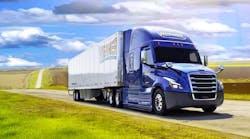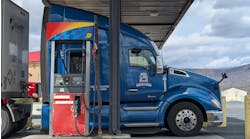Werner CEO: ‘We’re going to stay tech-agnostic’ rather than commit to electrics
Shaky financials and pressing infrastructure questions are keeping Werner Enterprises Inc. from making sizable bets on electric trucks, Chairman, President, and CEO Derek Leathers told a recent investment bank conference.
Speaking to the Morgan Stanley Laguna gathering earlier this month, Leathers reiterated his team’s commitment to reducing its carbon footprint by 55% by 2035 but added that getting there won’t be about committing to electrics for the No. 13 company on the 2023 FleetOwner 500: For-Hire list, particularly because of the costs involved now and into the future.
“The economics of long-haul EV are still very difficult to make work,” Leathers said. “It’s a highly subsidized current environment, and you must assume subsidies go away over time.”
See also: Truck charging in the real world
On top of that, Leathers noted, are questions both about the broader environmental issues around EV raw material and supply chains as well as the “nearly insurmountable” headwind from building out and paying for the infrastructure for charging specifically and a beefed-up electric grid more broadly.
The upshot: Werner, which has a fleet of nearly 10,000 tractors, will continue to spread its new-technology investments. Earlier this year, it placed two Freightliner eCascadia BEVs into service in Southern California and took delivery of its first renewable natural gas truck via a partnership with Cummins Inc.
“We’re going to stay tech-agnostic, and we’re going to continue to test hydrogen, dual-fuel, electric, and renewable natural gas,” Leathers told Morgan Stanley guests. “[We’ll] look across the entire spectrum to put the best technology where it makes the most sense.”
Also speaking to the Morgan Stanley conference, Schneider National Inc. CFO Steve Bruffett echoed Leathers’ approach of tackling decarbonizing through multiple approaches. That’s even though he and his team running the No. 7 carrier on the FleetOwner 500 already have committed more resources to electrics—most notably at its South El Monte intermodal depot in the Los Angeles area, which will house 100 tractors by year’s end.
See also: Schneider unveils large-scale SoCal EV charging depot
Bruffett was clear in his take on the financial equation of the nascent BEV truck segment, saying there is “absolutely no economic framework to support it as it is today” without large grants for equipment and chargers and that electric vehicles’ role in trucking could be “somewhat limited” in the near term. (Wisconsin-based Schneider is also testing other technologies, including hydrogen, which its leaders said has even less favorable economics at this point.) Whether that financial picture improves over time to make broad adoption a winning strategy, Bruffett noted, will depend on continued government support—which will differ from jurisdiction to jurisdiction.
“There are viable alternatives today that would significantly impact that equation,” he added. “But if it doesn’t satisfy the regulatory hurdles set in front of you [in terms of emissions targets], it becomes a moot discussion.”




